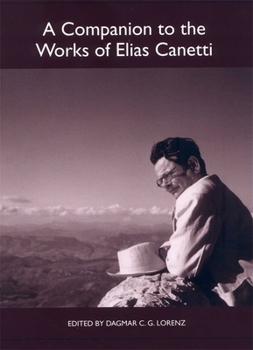Elias Canetti's Counter-Image of Society: Crowds, Power, Transformation
(Part of the Studies in German Literature Linguistics and Culture Series)
Pursues the unresolved question of Canetti's place as a cultural and civilizational critic. The award of the Nobel Prize for literature in 1981 has seemingly assured Elias Canetti's place in literary history. But his significance as a cultural critic has not been adequately recognized. The present study redresses this situation in two ways: by mapping the counter-image of human existence, history, and society that informs Canetti's critique of the modern world and its sciences; and by opening up Canetti's hermetic oeuvre by tracing his cryptic and often concealed dialogue with major figures within the Western tradition such as Hobbes, Durkheim, and Freud and contemporaries such as Adorno, Arendt, and Elias. The authors ask how Canetti's alternative vision of man and society relates to important themes of twentieth-century social and civilizational thought even as it calls into question fundamental assumptions of the social and human sciences. In analyses of Auto da F?, Crowds and Power, andthe aphorisms, the authors elucidate key aspects of Canetti's interrogation of human existence and human history across five thematic complexes: individual and social psychology, totalitarian politics, religion and politics, theories of society, and power and culture. They thus trace the movement of Canetti's thought from an apocalyptic sense of crisis to his search for cultural resources to set against the holocaust of European civilization.
Johann P.Arnason teaches sociology at La Trobe University, Melbourne and David Roberts is Emeritus Professor of German at Monash University, Melbourne.
Johann P.Arnason teaches sociology at La Trobe University, Melbourne and David Roberts is Emeritus Professor of German at Monash University, Melbourne.
Format:Hardcover
Language:English
ISBN:1571131604
ISBN13:9781571131607
Release Date:January 2004
Publisher:Camden House (NY)
Length:174 Pages
Weight:0.90 lbs.
Dimensions:0.5" x 6.1" x 9.3"
Customer Reviews
0 rating





